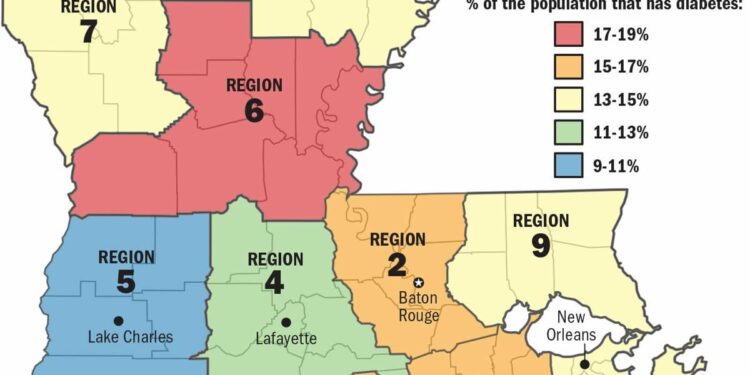What are some potential opportunities for improvement in addressing Louisiana’s diabetes epidemic?
Louisiana’s Diabetes Epidemic: How the State Compares to Others in Adult Health
Louisiana has earned a rather dubious distinction in recent years, leading the nation in adult obesity rates and consistently ranking high in the prevalence of diabetes. With an estimated 13.3% of adults living with diabetes, Louisiana outranks the national average of 10.5%. These statistics are troubling, and they raise questions about how Louisiana’s adult health measures up against other states in the United States.
Comparing Health Indicators Across States
When it comes to adult health indicators, it’s important to look beyond just the prevalence of diabetes. By comparing Louisiana to other states, we can gain insight into how lifestyle factors, socioeconomic conditions, and access to healthcare contribute to the overall health of adults. Let’s take a closer look at Louisiana’s health compared to other states in the country.
Obesity Rates
Obesity is a major risk factor for developing type 2 diabetes, and Louisiana has one of the highest obesity rates in the nation. According to the Centers for Disease Control and Prevention (CDC), Louisiana’s obesity rate is 36.8%, ranking it as the 5th highest state in the country. This is nearly 10 percentage points higher than the national average. Mississippi, West Virginia, and Arkansas are the only states with higher obesity rates. This suggests that Louisiana’s high obesity rate likely plays a significant role in the state’s high prevalence of diabetes.
Access to Healthcare
Access to healthcare is another important factor in managing and preventing diabetes. States with higher rates of uninsured adults may face challenges in providing diabetes screening, education, and treatment. According to the Kaiser Family Foundation, 12% of Louisiana adults are uninsured, which is higher than the national average of 9%. This lack of insurance coverage may result in delayed or inadequate diabetes care, leading to more severe complications.
Healthcare Spending
Healthcare spending can also affect the management of diabetes and other chronic conditions. In Louisiana, per capita healthcare spending is lower than the national average. The Louisiana Department of Health reports that the state’s per capita healthcare expenditure is $7,496, compared to the national average of $8,115. This could impact access to diabetes management programs, medications, and preventive care services in the state.
Challenges and Opportunities for Improvement
While Louisiana faces significant challenges in tackling its diabetes epidemic, there are also opportunities for improvement. By exploring the factors that contribute to the state’s high prevalence of diabetes, policymakers, healthcare providers, and community organizations can develop strategies to address these issues. Some potential areas for improvement include:
- Increasing access to affordable healthcare coverage for all adults
- Implementing community-based diabetes prevention and management programs
- Promoting healthy eating and active living initiatives statewide
- Enhancing screening and early detection efforts in underserved communities
- Investing in diabetes education and self-management support services
Case Study: Baton Rouge’s Diabetes Prevention Program
In Baton Rouge, a community-based initiative called “Healthy BR” has been working to address the city’s high rates of obesity and diabetes. Through a combination of lifestyle modification, nutrition education, and physical activity promotion, the program has helped participants reduce their risk of developing diabetes. By leveraging partnerships with healthcare providers, local businesses, and community leaders, Healthy BR has made significant strides in improving the health of its residents.
First-Hand Experience: A Louisiana Resident’s Perspective
As a resident of Louisiana, I have witnessed firsthand the impact of diabetes on individuals and families in our state. I have seen how limited access to healthcare, cultural norms around food, and socioeconomic disparities contribute to the high prevalence of diabetes here. However, I have also seen the resilience and determination of community members who are working to overcome these challenges and improve their health.
Practical Tips for Preventing Diabetes
If you live in Louisiana or any other state with high diabetes prevalence, there are steps you can take to reduce your risk of developing the disease. Some practical tips for diabetes prevention include:
- Eating a balanced diet rich in fruits, vegetables, whole grains, and lean proteins
- Engaging in regular physical activity, such as walking, cycling, or swimming
- Monitoring your blood sugar levels and seeking regular medical check-ups
- Avoiding tobacco use and excessive alcohol consumption
Louisiana’s diabetes epidemic presents a complex public health challenge that requires multifaceted solutions. By comparing the state’s health indicators to those of other states, we can gain valuable insights into the underlying factors contributing to the high prevalence of diabetes. Addressing these factors will require a coordinated effort from policymakers, healthcare providers, community organizations, and individuals alike. Through targeted interventions, education, and access to quality care, Louisiana can make meaningful strides in improving the health and well-being of its residents.
The 2022 Health Report Card from the Louisiana Department of Health shows an increase in the percentage of adults in Louisiana who have been diagnosed with diabetes. In 2019, the percentage was 12.6%, but it rose to 14.1% in 2020. Within the span of 2021 to 2022, 40,332 adults in Louisiana were newly diagnosed and are currently being treated for diabetes. Despite Louisiana moving to 46th in the nation for diabetes between 2019 and 2020, the state still has a lower percentage of adults diagnosed with diabetes in comparison to neighboring states like Alabama and Mississippi. However, it is important to note that the percentage is 33% higher than the national average.
It is essential to specify that the mentioned numbers exclude gestational diabetes (high blood sugar levels during pregnancy) and pre-diabetes (slightly elevated blood sugar levels) as they differentiate from typical diabetes.
The Louisiana Health Report Card, an annual publication by the Louisiana Department of Health, gives an overview of the overall health of citizens and the state’s health-related illnesses. Currently, the 2023 report is not yet available, but it is a crucial resource for understanding the healthcare landscape in Louisiana.






